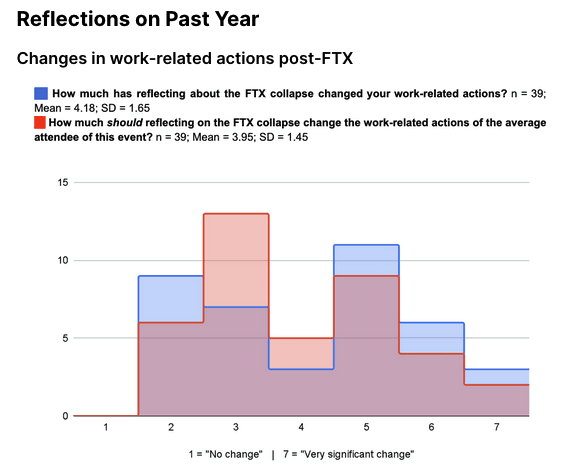A brief and belated update: When I resigned from the board of EV US last year, I was planning on writing about that decision. But I ultimately decided against doing that for a variety of reasons, including that it was very costly to me, and I believed it wouldn’t make a difference. However, I want to make it clear that I resigned last year due to significant disagreements with the board of EV and EA leadership, particularly concerning their actions leading up to and after the FTX crisis.
While I certainly support the boards’ decision to pay back the FTX estate, spin out the projects as separate organizations, and essentially disband EV, I continue to be worried that the EA community is not on track to learn the relevant lessons from its relationship with FTX. Two things that I think would help (though I am not planning to work on either myself):
- EA needs an investigation, done externally and shared publicly, on mistakes made in the EA community’s relationship with FTX.[1] I believe there were extensive and significant mistakes made which have not been addressed. (In particular, some EA leaders had warning signs about SBF that they ignored, and instead promoted him as a good person, tied the EA community to FTX, and then were uninterested in reforms or investigations after the fraud was revealed). These mistakes make me very concerned about the amount of harm EA might do in the future.
- EA also needs significantly more clarity on who, if anyone, “leads” EA and what they are responsible for. I agree with many of Will MacAskill’s points here and think confusion on this issue has indirectly resulted in a lot of harm.
CEA is a logical place to house both of these projects, though I also think leaders of other EA-affiliated orgs, attendees of the Meta Coordination Forum, and some people at Open Philanthropy would also be well-suited to do this work. I continue to be available to discuss my thoughts on why I left the board, or on EA’s response to FTX, individually as needed.
- ^
Although EV conducted a narrow investigation, the scope was far more limited than what I’m describing here, primarily pertaining to EV’s legal exposure, and most results were not shared publicly.


The issue is that there are degrees of naiveness. Oliver's view, as I understand it, is that there are at least three positions:
Optimizing too hard for reputation can get you into hot water, because you've hit the sour spot of being too naive to recognize that many others can see what you're doing and discount your signals accordingly, but not naive enough to just blithely do the obvious right thing without overthinking it.
There are obviously cases where reputation matters for impact, but many people fall into the trap of fixating on reputation when they lack the skill to take into account enough higher-order effects.
(Of course, the above isn't the only reason people might disagree on the utility of event venues. If you think EA is mainly bottlenecked on research and ideas, then you'll want to gather people together to solve problems and share their thoughts. If you instead think EA's big bottleneck is that we aren't drawing in enough people to donate to GiveWell top charities, then you should think events are a lot less useful, unless maybe it's a very large event targeted at drawing in new people to donate.)